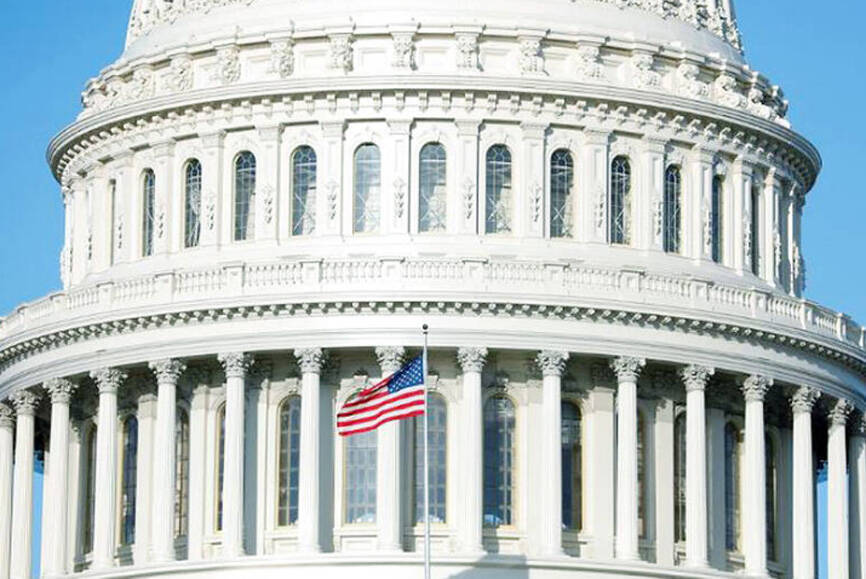Five US representatives on Friday called on US Secretary of State Antony Blinken to not impose conditions on President William Lai (賴清德) should he make a stopover in US territory during his trip to the South Pacific.
The representatives also urged US President Joe Biden to “consider meeting personally with Mr Lai during his visit.”
The letter was signed by US representatives Tom Tiffany, Andy Ogles, Chris Smith, Scott Perry and Lance Gooden about a week before Lai is scheduled to make his first official overseas visit since taking office on May 20.

Photo: Reuters
Lai is to travel to the Marshall Islands, Tuvalu and Palau from Saturday to Dec. 6, although the Ministry of Foreign Affairs has declined to confirm whether he and his delegation would stop over in US territory.
Plans for Lai’s transit during the South Pacific trip “are still being finalized,” Deputy Minister of Foreign Affairs Tien Chung-kwang (田中光) told a news conference in Taipei on Friday.
In their letter, the five representatives said that Blinken should “refrain from imposing arbitrary conditions” on Lai should he make a transit stop in the US, such as restricting his interactions with journalists or limiting his ability to conduct public engagements.
No US law concerning ties with Taiwan “call for prohibitions or limitations on visits by high-ranking Taiwanese officials, including their duly elected president,” they said.
“In fact, the contrary is true: Our statutes explicitly guarantee that Taiwan’s president ‘shall be admitted’ to the US for discussions with American officials, and make it the policy of the United States to expand such high-level visits in the future,” the letter said.
They also criticized Beijing’s calls on Washington to block a potential stopover by Lai in the US as “outrageous and unacceptable,” adding that interference in US internal affairs “should be forcefully and publicly rejected.”
They were referring to comments by Chinese Ministry of Foreign Affairs spokesman Lin Jian (林劍) at a news conference earlier this month.
Lin said that China “consistently opposes the US arrangements of such transits.”
“We urge Washington to ... not allow Lai Ching-te to transit [through the US] and not send wrong signals to Taiwan independence forces,” he said.
Despite a lack of formal diplomatic relations, Washington has allowed Taiwanese presidents to make stopovers on US soil during their trips to visit Taiwan’s diplomatic allies.
Former president Tsai Ing-wen (蔡英文) traveled to the South Pacific twice during her two four-year tenures, in 2017 and 2019. Her 2017 trip included layovers in Honolulu, Hawaii, and Guam, and her 2019 trip included a stopover in Honolulu.

Right-wing political scientist Laura Fernandez on Sunday won Costa Rica’s presidential election by a landslide, after promising to crack down on rising violence linked to the cocaine trade. Fernandez’s nearest rival, economist Alvaro Ramos, conceded defeat as results showed the ruling party far exceeding the threshold of 40 percent needed to avoid a runoff. With 94 percent of polling stations counted, the political heir of outgoing Costa Rican President Rodrigo Chaves had captured 48.3 percent of the vote compared with Ramos’ 33.4 percent, the Supreme Electoral Tribunal said. As soon as the first results were announced, members of Fernandez’s Sovereign People’s Party

MORE RESPONSIBILITY: Draftees would be expected to fight alongside professional soldiers, likely requiring the transformation of some training brigades into combat units The armed forces are to start incorporating new conscripts into combined arms brigades this year to enhance combat readiness, the Executive Yuan’s latest policy report said. The new policy would affect Taiwanese men entering the military for their compulsory service, which was extended to one year under reforms by then-president Tsai Ing-wen (蔡英文) in 2022. The conscripts would be trained to operate machine guns, uncrewed aerial vehicles, anti-tank guided missile launchers and Stinger air defense systems, the report said, adding that the basic training would be lengthened to eight weeks. After basic training, conscripts would be sorted into infantry battalions that would take

GROWING AMBITIONS: The scale and tempo of the operations show that the Strait has become the core theater for China to expand its security interests, the report said Chinese military aircraft incursions around Taiwan have surged nearly 15-fold over the past five years, according to a report released yesterday by the Democratic Progressive Party’s (DPP) Department of China Affairs. Sorties in the Taiwan Strait were previously irregular, totaling 380 in 2020, but have since evolved into routine operations, the report showed. “This demonstrates that the Taiwan Strait has become both the starting point and testing ground for Beijing’s expansionist ambitions,” it said. Driven by military expansionism, China is systematically pursuing actions aimed at altering the regional “status quo,” the department said, adding that Taiwan represents the most critical link in China’s

‘REALLY PROUD’: Nvidia would not be possible without Taiwan, Huang said, adding that TSMC would be increasing its capacity by 100 percent Nvidia Corp CEO Jensen Huang (黃仁勳) on Saturday praised and lightly cajoled his major Taiwanese suppliers to produce more to help power strong demand for artificial intelligence (AI), capping a visit to the country of his birth, where he has been mobbed by adoring fans at every step. Speaking at an impromptu press conference in the rain outside a Taipei restaurant, where he had hosted suppliers for a “trillion-dollar dinner,” named after the market capitalization of those firms attending, Huang said this would be another good year for business. “TSMC needs to work very hard this year because I need a lot